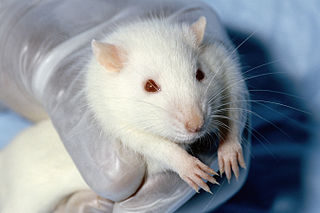
In vitro studies are performed with microorganisms, cells, or biological molecules outside their normal biological context. Colloquially called "test-tube experiments", these studies in biology and its subdisciplines are traditionally done in labware such as test tubes, flasks, Petri dishes, and microtiter plates. Studies conducted using components of an organism that have been isolated from their usual biological surroundings permit a more detailed or more convenient analysis than can be done with whole organisms; however, results obtained from in vitro experiments may not fully or accurately predict the effects on a whole organism. In contrast to in vitro experiments, in vivo studies are those conducted in living organisms, including humans, and whole plants.

A model organism is a non-human species that is extensively studied to understand particular biological phenomena, with the expectation that discoveries made in the model organism will provide insight into the workings of other organisms. Model organisms are widely used to research human disease when human experimentation would be unfeasible or unethical. This strategy is made possible by the common descent of all living organisms, and the conservation of metabolic and developmental pathways and genetic material over the course of evolution.
Zoology is the branch of biology that studies the animal kingdom, including the structure, embryology, evolution, classification, habits, and distribution of all animals, both living and extinct, and how they interact with their ecosystems. The term is derived from Ancient Greek ζῷον, zōion, i.e. "animal" and λόγος, logos, i.e. "knowledge, study".

Zooarchaeology is the branch of archaeology that studies faunal remains related to ancient people. Faunal remains are the items left behind when an animal dies. It includes: bones, shells, hair, chitin, scales, hides, proteins and DNA. Of these items, bones and shells are the ones that occur most frequently at archaeological sites where faunal remains can be found. Most of the time, most of the faunal remains do not survive. They often decompose or break because of various circumstances. This can cause difficulties in identifying the remains and interpreting their significance.
Culture theory is the branch of comparative anthropology and semiotics that seeks to define the heuristic concept of culture in operational and/or scientific terms.

Animal testing, also known as animal experimentation, animal research and in vivo testing, is the use of non-human animals in experiments that seek to control the variables that affect the behavior or biological system under study. This approach can be contrasted with field studies in which animals are observed in their natural environments or habitats. Experimental research with animals is usually conducted in universities, medical schools, pharmaceutical companies, defense establishments and commercial facilities that provide animal-testing services to industry. The focus of animal testing varies on a continuum from pure research, focusing on developing fundamental knowledge of an organism, to applied research, which may focus on answering some question of great practical importance, such as finding a cure for a disease. Examples of applied research include testing disease treatments, breeding, defense research and toxicology, including cosmetics testing. In education, animal testing is sometimes a component of biology or psychology courses. The practice is regulated to varying degrees in different countries.
Comparative psychology refers to the scientific study of the behavior and mental processes of non-human animals, especially as these relate to the phylogenetic history, adaptive significance, and development of behavior. Research in this area addresses many different issues, uses many different methods and explores the behavior of many different species from insects to primates.

Parasitology is the study of parasites, their hosts, and the relationship between them. As a biological discipline, the scope of parasitology is not determined by the organism or environment in question but by their way of life. This means it forms a synthesis of other disciplines, and draws on techniques from fields such as cell biology, bioinformatics, biochemistry, molecular biology, immunology, genetics, evolution and ecology.

Vivisection, also known as V-section, is surgery conducted for experimental purposes on a living organism, typically animals with a central nervous system, to view living internal structure. The word is, more broadly, used as a pejorative catch-all term for experimentation on live animals by organizations opposed to animal experimentation, but the term is rarely used by practising scientists. Human vivisection, such as live organ harvesting, has been perpetrated as a form of torture. However, as vivisection etymologically means a surgery on a living being, all forms of open surgery on living people are literally human vivisection.

Animal cognition describes the mental capacities of non-human animals and the study of those capacities. The field developed from comparative psychology, including the study of animal conditioning and learning. It has also been strongly influenced by research in ethology, behavioral ecology, and evolutionary psychology, and hence the alternative name cognitive ethology is sometimes used. Many behaviors associated with the term animal intelligence are also subsumed within animal cognition.
Animal languages are forms of non-human animal communication that show similarities to human language. Animals communicate by using a variety of signs such as sounds or movements. Such signing may be considered complex enough to be called a form of language if the inventory of signs is large, the signs are relatively arbitrary, and the animals seem to produce them with a degree of volition. In experimental tests, animal communication may also be evidenced through the use of lexigrams. While the term "animal language" is widely used, researchers agree that animal languages are not as complex or expressive as human language.

Dissection is the dismembering of the body of a deceased animal or plant to study its anatomical structure. Autopsy is used in pathology and forensic medicine to determine the cause of death in humans. Less extensive dissection of plants and smaller animals preserved in a formaldehyde solution is typically carried out or demonstrated in biology and natural science classes in middle school and high school, while extensive dissections of cadavers of adults and children, both fresh and preserved are carried out by medical students in medical schools as a part of the teaching in subjects such as anatomy, pathology and forensic medicine. Consequently, dissection is typically conducted in a morgue or in an anatomy lab.
Cognitive ethology is a branch of ethology concerned with the influence of conscious awareness and intention on the behaviour of an animal. Donald Griffin, a zoology professor in the United States, set up the foundations for researches in the cognitive awareness of animals within their habitats.

A biologist is a scientist who has specialized knowledge in the field of biology, the scientific study of life. Biologists involved in fundamental research attempt to explore and further explain the underlying mechanisms that govern the functioning of living matter. Biologists involved in applied research attempt to develop or improve more specific processes and understanding, in fields such as medicine and industry.

Anthrozoology is the subset of ethnobiology that deals with interactions between humans and other animals. It is an interdisciplinary field that overlaps with other disciplines including anthropology, ethnology, medicine, psychology, veterinary medicine and zoology. A major focus of anthrozoologic research is the quantifying of the positive effects of human-animal relationships on either party and the study of their interactions. It includes scholars from fields such as anthropology, sociology, biology, history and philosophy.
Biology is the natural science that studies life and living organisms, including their physical structure, chemical processes, molecular interactions, physiological mechanisms, development and evolution. Despite the complexity of the science, there are certain unifying concepts that consolidate it into a single, coherent field. Biology recognizes the cell as the basic unit of life, genes as the basic unit of heredity, and evolution as the engine that propels the creation and extinction of species. Living organisms are open systems that survive by transforming energy and decreasing their local entropy to maintain a stable and vital condition defined as homeostasis.

Zoophilia is a paraphilia involving a sexual fixation on non-human animals. Bestiality is cross-species sexual activity between human and non-human animals. The terms are often used interchangeably, but some researchers make a distinction between the attraction (zoophilia) and the act (bestiality).
Ethnozoology is the study of the past and present interrelationships between human cultures and the animals in their environment. It includes classification and naming of zoological forms, cultural knowledge and use of wild and domestic animals. It is one of the main subdisciplines of ethnobiology and shares many methodologies and theoretical frameworks with ethnobotany.

Anthropomorphism is the attribution of human traits, emotions, or intentions to non-human entities. It is considered to be an innate tendency of human psychology.

Human–canine bonding is the relationship between dogs and humans. This bond can be traced back at least 15,000 to 30,000 years ago to the Bonn-Oberkassel dog that was found buried with two humans. In the United States, over 48% of households have a pet dog. For centuries, dogs have been labeled as "man's best friend," offering companionship and loyalty to their human counterparts. This is evident in most homes where dogs are domesticated. Children and adults have cordial relationships with all kinds of dogs.












